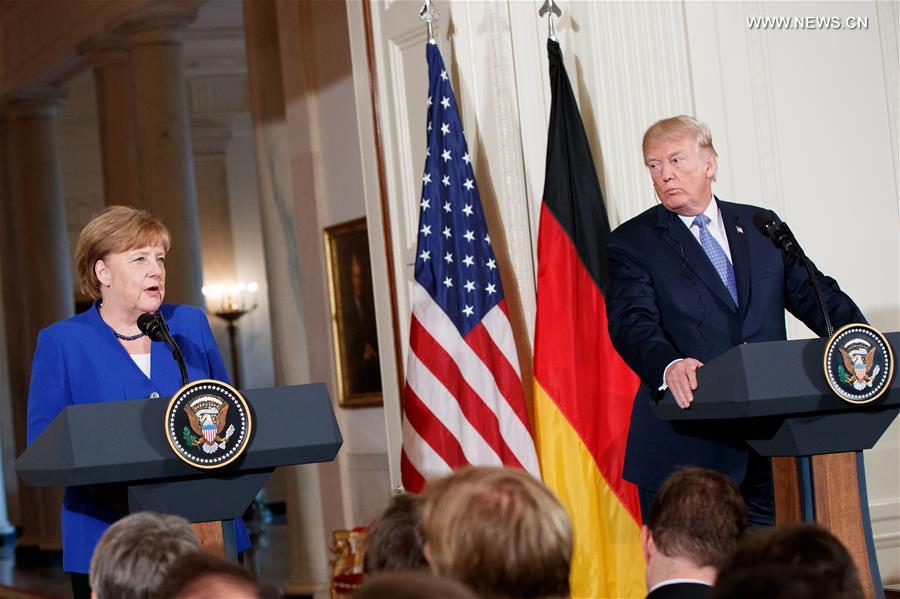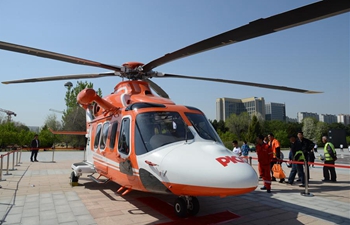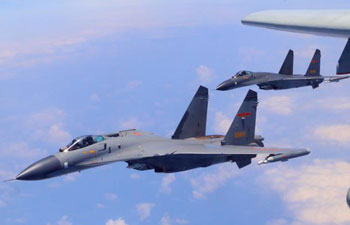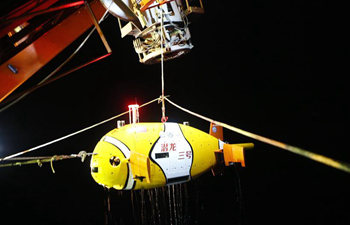
U.S. President Donald Trump (R) attends a joint press conference with German Chancellor Angela Merkel at the White House in Washington D.C., the United States, on April 27, 2018. (Xinhua/Ting Shen)
WASHINGTON, April 28 (Xinhua) -- In sharp contrast with his "bromance" with French President Emmanuel Macron, U.S. President Donald Trump treated German Chancellor Angela Merkel, who paid a quick visit Friday, with a belligerent reaffirmation of "America First" in terms of trade, the NATO defense budget, and the Iran nuclear deal.
Trump and Merkel apparently failed to narrow their differences over these issues that have driven the two nations apart since the Trump administration took office in 2017.
"NATO HELPS EUROPE MORE THAN U.S."
Trump has lashed out at NATO members, Germany in particular, for failing to increase their national defense budget to 2 percent of their GDP, though they had promised in 2014 to achieve it in 10 years.
At the joint press conference with Merkel Friday, he said, "We're protecting Europe and yet, we pay, by far, more than anybody else." "NATO is wonderful but it helps Europe more than it helps us. And why are we paying the vast majority of the costs?" he asked.
In response, Merkel said Germany will earmark 1.3 percent of its GDP for defense in 2019, pointing out that there has been an increase over the past few years.
"We haven't yet met the target where we should be, but we are getting closer to the target ... that we've set up for ourselves," she said.
It was a rare concession by Merkel, who responded to Trump's America First slogan by saying, "We in Europe have to take our fate into our own hands."
Darrell West, a senior fellow at U.S. think tank Brookings Institution, told Xinhua that "Trump has made the relationship worse with his embrace of ultra-nationalism and rude behavior towards U.S. allies."
"If that continues, it will cause the U.S. and EU to drift further apart," West said.
"WE NEED RECIPROCAL RELATIONSHIP"
Trump also said that U.S. trade relations with Germany, and the EU at large, were not "reciprocal".
Pointing out the U.S. trade deficit with the EU -- 151 billion U.S. dollars -- he said, "Also vital to our security, and that of our allies, is America's ability to maintain a strong and robust manufacturing base ...That's why we must have a fair and reciprocal trading relationship with our friends and partners."
The two sides also seemed to fail to reach an agreement over Trump's threat to largely increase tariffs on imported steel and aluminum. Merkel said it is up to Trump to decide whether to exempt the EU from the tariffs before the May 1 deadline.
"The president obviously is not satisfied with the trade surplus. We have already been able to reduce that," she said. "Not only hundreds of thousands of cars are exported from Germany to the United States, but from the U.S. to the rest of the world ... creating American jobs."
That too failed to sway Trump. Saying people in Germany and some other countries may not like him, he remarked, "That means I'm doing a good job because I'm representing the United States."
IRAN DEAL "ONE PIECE" IN MOSAIC
Trump continued his rhetoric against Tehran and the Joint Comprehensive Plan of Action (JCPOA), the nuclear deal reached in 2015 among China, Germany, Russia, the UK and U.S., the EU and Iran. His newly picked Secretary of State Mike Pompeo said in Brussels Friday that the U.S. was unlikely to remain in the deal.
Trump vowed to ensure that Iran ends its missile production, "does not even get close to a nuclear weapon", or profit from the U.S. "success" in the Middle East.
He also urged coalition and regional partners to step up their financial and military contributions to the U.S.-led anti-Islamic State drive.
While acknowledging that the current deal is not sufficient, Merkel called it "a first step" that has contributed to the slowing of Iranian nuke activities. She called the current deal "one piece of the mosaic, one building block, if you like, on which we can build up this structure."
"The whole of the region, obviously, is of prime importance to us, because it's not a thousand kilometers away ... Syria and Iran are countries that are right on our doorstep," she added.
Christopher Galdieri, assistant professor at the U.S. Saint Anselm College, told Xinhua that the Trump-Merkel relations are "frosty" in part because "she sees him as dangerous and he sees her as part of the international order he (and many of those around him are) so critical of."
"Trump sees good relations with Macron as a counterweight to his poor ones with Merkel," he added.














